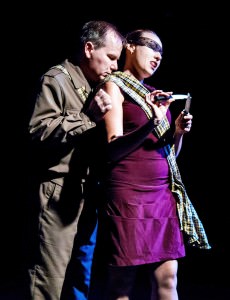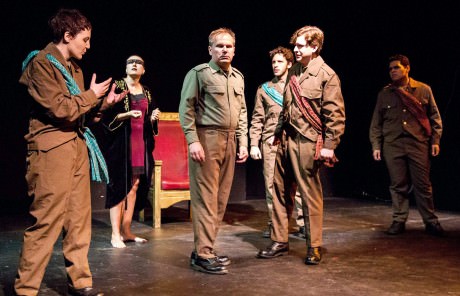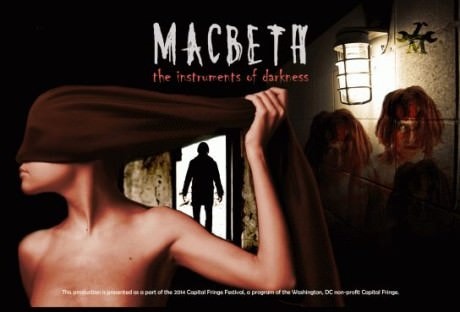Macbeth, a classic Shakespearean tale of one man’s quest for Scotland’s reign and the lengths he is willing to go for it, is often performed melodramatically with flawed characters that passionately struggle with their inner demons. For many, it would be an easy choice to portray the characters as malevolent, sociopathic monsters willing to murder in order to fulfill the witches’ prophecies. However, in The Rude Mechanicals’ production of Macbeth: The Instruments of Darkness, Director Joshua Engel illustrated Macbeth in a more human light than we normally see him, and we see the affection that exists between Macbeth and his Lady. Fresh from this year’s Capital Fringe Festival, this production of Macbeth is powerful and unique.

The title character was played gracefully by Alan Duda. His performance combined power with subtlety in a way that uniquely made Engel’s version of Macbeth more of an Everyman than a hallowed war hero on a path to destruction. Duda shined the most during Macbeth’s self-doubting monologues, particularly his final one when he proclaims that life is nothing more than a story:
“It is a tale
Told by an idiot, full of sound and fury,
Signifying nothing.”
Creatively, Engel centered the production around the motif of darkness leading to ignorance and superstition. His decision to blindfold Lady Macbeth for the entirety of the show was a smart way of showing her comfort with darkness and the unknown. As the show progressed, the blindfold gradually appears to become a part of her, almost as if it would be strange to see her without it.
Jaki Demarest did a wonderful job of embracing the darkness in her portrayal of Lady Macbeth. She was incredibly comfortable in her own skin and made great active choices in interpreting the physicality of the character. Her energy never lagged and despite not being able to see her surroundings, she maintained great chemistry with Duda. Demarest was at her best while writhing in the cold-hearted plotting of King Duncan’s murder and later during the famous “Out, damned spot.”
Marlow Vilchez gave a well-rounded performance as Banquo. He intonated well and played the character with a remarkable sense of balance. Vilchez’s sense of time and place is especially evident in the opening scene where Macbeth and Banquo first encounter the witches, and later when being honored by King Duncan.
The trio of Ross, Malcolm, and Macduff, acted respectively by Holly Trout, Evan Ockershausen, and Michael C. Robinson, played well off each other, particularly in their efforts to vanquish Macbeth toward the end of the show. Though only on stage for a short time, Sam David as Lady Macduff gave a heartfelt performance with a level of nuance usually reserved for films. Another character whose time on stage was short-lived was Duncan, played by Michael McCarthy, and McCarthy took full advantage of every minute he was on stage.
Another group that worked well together was the trio of Rebecca Speas, Diane Samuelson, and Lauren Beward as the witches. The three were not afraid to experiment with varying vocal and physical levels. They used every corner of the stage and moved with purpose, exuding “evil” with every step.
One of the highlights of the show was Melissa Schick breaking the fourth wall as the Porter. She singled out three members of the audience from each side of the black box to interact as candidates for admission into Hell. Her scene incorporated an element of well-timed crude humor almost reminiscent of Scapino from the Commedia dell‘arte era of Italian theatre.
The technical elements of the show were effective as well. In a small black box setting, the fog from the witches’ scenes permeated the audience, making one feel a part of the darkness that Engel was aiming for. To contrast with the darkness, Lighting Designer Irene Sitoski created a bright white silhouette of the dagger that Macbeth longs to clutch, but then fades. Sitoski also was responsible for the hints of purple and blue light during most of the dialogue, which fits nicely with the theme of darkness.

Sound Designer Eric Honour did a good job of making the background sound creepy, but not overbearing. The set itself was no more than a throne at upstage center, but for the purpose of a black box, it worked.
The costumes, designed by Moira Parham and Trevor Jones, gave the show a sense of neutrality in terms of time depiction. The show could’ve been set in the 1600s or the 1900s depending on your worldview. The climatic fight scene at the end, as choreographed by Erin McDonald, was entertaining and well-blocked.
Running Time: 75 minutes, with no intermission.
Macbeth plays through August 23, 2014 at The Rude Mechanicals performing at the Greenbelt Arts Center—123 Centerway in Greenbelt, MD. For tickets, call (301) 441-8770, or purchase them online.





